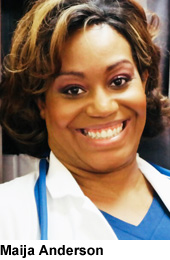Educators reflect on how negative experiences can inspire positive outcomes.

Drawing from past negative experiences, the authors describe how they are using them to create positive learning environments for the next generation of nurses.
What do you see when you look at me? —Author unknown
Maija Anderson:
 I entered nursing school at age 16, shortly after graduating from high school. I was young, intelligent, privileged to have had entirely private-school education—and I was black. In an ideal world, only my intelligence and my excellent prep school education should have affected how members of the nursing faculty and administration perceived me academically. But we don’t live in an ideal world, so their perception was tainted by my age and my race. I had to endure thinly veiled references and innuendos: My intelligence wasn’t a factor in my acceptance into the nursing program. I was too immature to make decisions without my parents. I had no business being a nurse.
I entered nursing school at age 16, shortly after graduating from high school. I was young, intelligent, privileged to have had entirely private-school education—and I was black. In an ideal world, only my intelligence and my excellent prep school education should have affected how members of the nursing faculty and administration perceived me academically. But we don’t live in an ideal world, so their perception was tainted by my age and my race. I had to endure thinly veiled references and innuendos: My intelligence wasn’t a factor in my acceptance into the nursing program. I was too immature to make decisions without my parents. I had no business being a nurse.
As you might suspect, my first year didn’t go or end well. My last interaction with faculty at that school came during clinical rotation for mental health nursing. On the first day, a member of the clinical faculty pulled me aside during post-conference for a one-on-one meeting. She told me that, no matter what I did, I wouldn’t pass this course because I was too young and immature to be a nurse. Rather than have me subjected to further vitriol and to avoid having my sister, who had just graduated from high school, experience similar treatment, my mother pulled me from the program and sent both of us to Tennessee State University (TSU), an historically black institution.
I will never forget the dramatic change in environment and the incredible support I received from my instructors at TSU. They held us to high standards because they knew that, as members of a minority in the nursing profession, we faced additional challenges that could be detrimental to our success. I finished my first nursing degree at Tennessee State and went on to earn degrees at Andrews University and Rush University College of Nursing.
I like to think that negative experiences that don’t break us make us stronger. Although still haunted by my first year of nursing school, the support I received at TSU laid the groundwork for me to achieve my goal of becoming a nurse educator. I also like to think that I have a backbone of steel forged by the adversity I encountered that first year, but it was my time at TSU that gave me the compassion, empathy, courage, and drive to help others. Being told that I was too young and immature to be a nurse served as impetus for me to become a nurse.
Identifying with nursing faculty who looked like me, were tough while supporting me, and were proud of my achievements made me the nurse I am today. My experience in working with underserved populations, combined with my undergraduate and graduate education, gave me a better sense of the type of nurse and educator I wanted to be. In retrospect, I’m grateful for both my negative and positive education experiences as they now serve as exemplars of what to do and what not to do in engaging the next generation of nurses, in mentoring nurses, and in caring for patients.
Malliga Jambulingam:
 As a child, I knew I wanted to be a nurse. I learned a proverb from my parents, “Aim high and work toward it.” So I worked hard to become a nurse and eventually earned a Doctor of Philosophy in Nursing degree. I have now been in the nursing profession for 26 years and enjoy my work life. I am enthusiastic, hardworking, proactive, and take personal interest in student development. I want my legacy to be that I promoted positive outcomes in nursing by preparing future nurses to become leaders. I am, therefore, actively involved in leadership, scholarship, and academic research, and I am proud to be part of a teaching community where I can help develop the next generation of nurses.
As a child, I knew I wanted to be a nurse. I learned a proverb from my parents, “Aim high and work toward it.” So I worked hard to become a nurse and eventually earned a Doctor of Philosophy in Nursing degree. I have now been in the nursing profession for 26 years and enjoy my work life. I am enthusiastic, hardworking, proactive, and take personal interest in student development. I want my legacy to be that I promoted positive outcomes in nursing by preparing future nurses to become leaders. I am, therefore, actively involved in leadership, scholarship, and academic research, and I am proud to be part of a teaching community where I can help develop the next generation of nurses.
Thinking back on my journey as a nurse educator and recalling experiences that influenced how I approach teaching, one, in particular, comes to mind. As a clinical faculty member, I had taken my students to the assigned unit, where we found another student group. I observed that the faculty person for the other group hadn’t prepared prior to bringing students on the unit and, as a result, was unfamiliar with the environment. When the students arrived, staff nurses were busy completing their tasks and, thus, were unable to engage with either the faculty member or the students. This created a stressful situation for the students, who felt they had been placed in an unsupportive learning environment. This negative situation could have been mitigated had the teacher been adequately prepared.
This and other nursing experiences have helped me develop a good understanding of positive and negative ways to approach nursing—factors that influence student perceptions toward the profession. Negative things students have identified in feedback to me include unprofessional attitudes, lack of respect, lack of cooperation, and unreasonable expectations. H.C. Tseng and colleagues found that negative nursing perceptions that students acquire in practicums may dissuade them from entering the profession or discourage practicing nurses from remaining in the workplace. Positive observations, on the other hand, help motivate students to enter the profession or, in the case of practicing nurses, influence them to remain.
In the Nursing Program at Morgan State University (MSU) School of Community Health and Policy, we seek to uproot negative attitudes and perceptions of nursing (weeds), planting in their place quality “seeds” of positivity that brighten the “garden” of nursing—that encourage nursing students to complete their degrees. We also help faculty members develop an awareness of their behaviors so that planted seeds are nourished and grow into healthy plants, thereby producing a generation of nurses with positive attitudes that encourage established nurses to remain in the profession.
Reaping what we sow: Growing a positive learning environment
A positive learning environment is a crucial component of student success. Creating a positive environment doesn’t happen instinctively; it takes conscious, intentional effort. Civility is key. The following faculty behaviors contribute to an atmosphere of civility in the classroom:
- Engaging students in a positive manner
- Dressing professionally
- Being prepared for class
- Communicating respectfully (faculty, students, and peers)
- Serving as a role model
- Setting expectations early on
- Keeping your word
- Adopting diverse teaching and learning strategies
- Addressing disruptive behavior
Faculty behaviors that promote positive student attitudes in the clinical setting include:
- Training faculty members on the unit prior to student arrival
- Orienting students to unit policies, documents, and staff members
- Developing a positive working relationship with unit personnel
- Encouraging a positive working relationship between students and unit staff members
- Supporting students in stressful situations
A quote attributed to Confucius reads, “By three methods we may learn wisdom: first, by reflection, which is noblest; second, by imitation, which is easiest; and third, by experience, which is the bitterest.” At MSU, our motto is, “Growing the future; leading the world.” Our reflections and lived experiences guide us in making our students’ learning experiences positive. Our legacy is the nurses we develop.
Malliga Jambulingam, PhD, RN, CEIM, is assistant professor and program coordinator, Nursing Program, at Morgan State University, School of Community Health and Policy, Baltimore, Maryland, USA. Maija R. Anderson, DNP, RN, is director of the Nursing Program at MSU.
Editor’s note: Malliga Jambulingam will present a session titled “Self-Awareness of Civility Among Nursing Faculty in Creating a Positive Learning Environment,” on Saturday, 21 April, at Nursing Education Research Conference 2018 in Washington, D.C.
Check out these additional articles by presenters at Nursing Education Research Conference 2018.